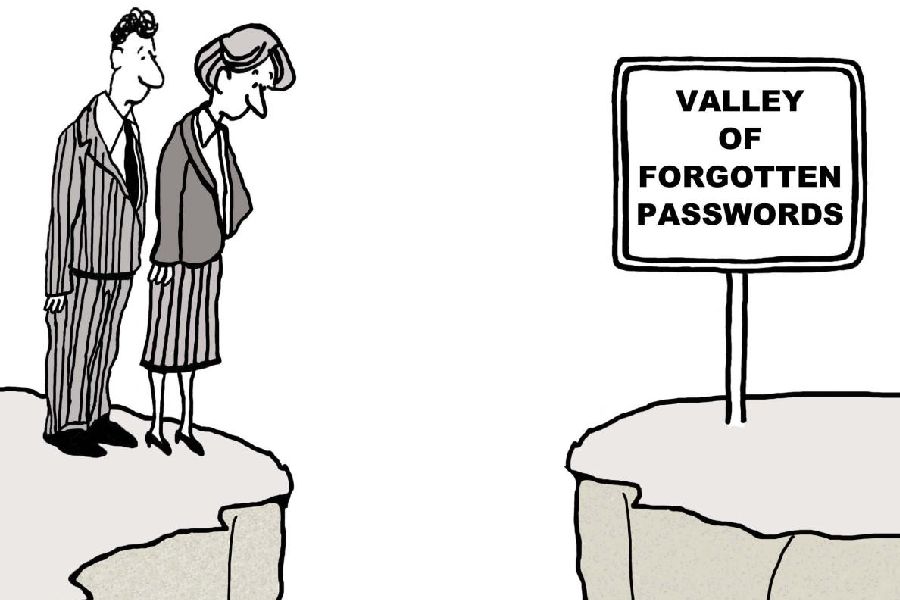There’s a time for everything, so says the Bible. A time to be born, a time to die. A time to plant, and a time to pluck that which is planted, and so on. New times call for new mantras. The mantra for today is — a password to kill, and a password to heal, a password to break down, and a password to build up, a password to weep, and a password to laugh...
You get the idea?
There is a password for almost everything, no matter which world you wade through. And never mind if it seems like an antiquated human quality, our passwords must bear “strength of character”. Also be unique, each time.
As if that’s not all, you repeat that rigmarole every few weeks. A vicious cycle.
Like many of my generation, I maintain a notebook of things. Things like important phone numbers — what if I lose my phone, how will I SOS my family — bills paid each month, offspring-related digits, electricity account details... There’s just so much one needs to carry on one’s person.
I realise there is also precious art in that notebook. Real, existential art, if you will. Page upon page of scratched-out old passwords, in blue, black and red. A few in green and pink as well. Some relegated to the bin with plain slashes, most vehemently written over to obscure detection. A few peeking still, unrestricted, from within the mesh.
When I turn those pages, it reveals bits of my own history. The quaint name of a travel website I used at some point of time, along with the username and password. Those of a blog that I created but never wrote. Long passwords containing loved words — fiasco, hiraeth, sirimiri, Zindagi Gulzar Hai. Names of offspring — two-legged and four-legged, special names, curse words. In permutations and combinations, spiced with a special character. Imagine the range and depth of it all, ugly scratched-out pages hiding all those stories. If I were to approach an art house, the pages could be worth millions. Displayed inside expensive glass, a distance away from visitors.
But I am romanticising. And the problem at hand is anything but. The password crisis catches you unawares, and almost breaks you — you set out to accomplish something and get turned away from the door. The other day, I was attempting to access one of the several things-to-do interfaces in the workplace. A window most frightening popped up. It read: create a new, strong password that you don’t use for other websites. How perplexing! Never in the past did this site need a password. Why now?
I decided to let it be for a few days secretly hoping that window would melt away. A week later I clicked on the site again, gingerly, and again the password monster jumped out. I decided to deal with it, get to know it better. To my disbelief, it was asking me to change my gmail password. But why on earth would it make such a demand, when my gmail itself wasn’t?
After frantic calls to the HR and IT departments, I had to comply. It’s a simple thing, they said. Little would they understand that the people-password relationship is “complicated”.
Apparently, this isn’t just me. There is something called “password fatigue”, a fancy phrase I recently chanced upon. The average adult in the US, reportedly, has at least 100 passwords to keep track of. Experts say it can wear down people, lead to risky behaviour.
Most sites recommend something called a “password manager”. I must admit, the very sound of it spells more fear.
So I did what any non-tech savvy person might do. I asked around how people cope with this elephant in the room. A senior journalist said he often uses names of Cabinet ministers for passwords. Innovative. Another friend who teaches history said her passwords are often drawn from historical events and their dates, names of historians and the titles of their books, etc. Makes sense.
But what baffles me is why we must be put through so much. A single bank account, for example, has two rites of passage. One for the mobile app and another for Internet banking. There’s an MPIN too somewhere. I am not even going anywhere near the OTP business.
Recently, I opened the banking app on my phone and it wouldn’t let me in. Why? Because the password of the other set had expired. Which is like saying — I can’t get into my house because my good neighbour lost the key to her house. I pulled out my notebook, diligently typed in my neighbour’s details, rechecking it before the final click. Still the monster wouldn’t budge — there was an error somewhere. After three attempts, I was locked out.
No, I don’t want to know the enemy anymore. I want to go back to the old system of walking to the bank, taking a token, waiting till the teller calls and coming out like nothing happened.
Not really possible, but you get the drift. Hiraeth will continue to be a favourite word.










